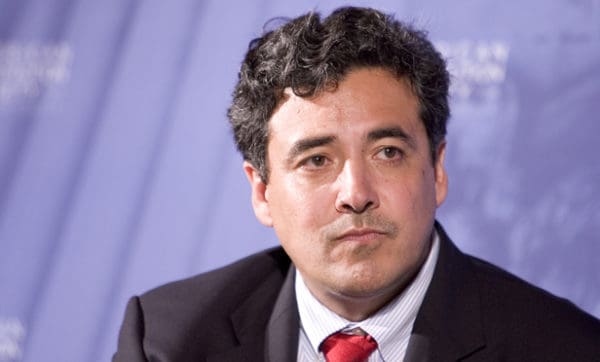The U.S. Solicitor General is often referred to as the tenth justice of the Supreme Court because the General is the most frequent attorney to appear before the Court, and generally established a close relationship. President Trump today announced that he was nominating acting Solicitor General Noel J. Francisco to the office.
Mr. Francisco has a long track record of generally opposing the administrative state. For reasons mentioned earlier, that’s a good thing as far as Second Amendment advocates are concerned. Administrative law is something akin to a poison gas that the government can use against our constitutionally-protected rights.
Jonathan Adler at the Vololkh Conspiracy blog says that in a 2011 hearing before the U.S. House, Francisco expressed skepticism of the Chevron doctrine. That doctrine requires courts to endorse rules imposed by unelected bureaucrats even if their constitutionality is uncertain.
If the Obama administration’s moves to ban certain 5.56mm ammunition used in many common rifles in 2015 had not been staved off by a huge public outcry, Chevron would have made constitutional challenges to the rule tricky.
Mr. Francisco doesn’t have much of a record on the Second Amendment, which isn’t that surprising given that he served at BigLaw firm Jones Day for the past eleven years. Big firms such as Jones day, like their corporate masters, tend to be institutionally indifferent or hostile to the right to keep and bear arms.
Francisco, however, served as law clerk to Antonin Scalia during the 1997 term and offered these words in remembrance of the late justice last year, which I will leave for your consideration:
One of the great things that Justice Scalia always did with his law clerks before he actually cast a vote in a case is, he would bring the law clerks into chambers, and we would have a pretty open debate….
This one particular case involved the statute that was 18 U.S.C. § 922, which prohibits felons from possessing firearms. It was not a particularly important case, but the issue turned on whether this particular felon had violated this statute by being in possession of a firearm. The clerks were debating pretty vigorously back and forth.
As we went on and on, the Justice swiveled around in his chair with his back to us. At one point, one of the clerks that thought the felon hadn’t violated the statute invoked the Second Amendment, in response to which another one of the more liberal clerks declared, “Well, surely, you don’t think the Second Amendment protects felons.” In response to which, the first clerk declared, “When the revolution comes, we’re going to need the felons, too.”
At that point, I looked up at Justice Scalia, and I saw the back of his head, and he was just bouncing up and down, laughing. Justice Scalia had a wonderful face and an expressive face, but when I remember Justice Scalia, I will always remember the back of his head bouncing up and down in laughter.





So, the big question is: Was Scalia laughing AT the clerk, or WITH him?
Sometimes it’s neither.
Sometimes it’s the person thinking rather sadly that the others can’t get past scratching the surface and other times it’s a laugh that indicates “Yes, now we’re getting somewhere, God I love it when this happens!”.
When the revolution comes, we’re all felons.
Briefly, one hopes.
“Treason doth never prosper, what’s the reason? For if it prosper, none dare call it Treason.”
“When the revolution comes, we’re all felons.”
Yes.
Or is it….”When we are all felons because of unconstitutional law, then comes the revolution”?
One is a more specific case, the other a more general case, both correct.
Are not felons, upon release, also “the people”?
Released convicts are routinely saddled with lifelong prohibitions of various kinds. It’s a fairy tale to think that once they’re released back into society that they automatically receive all of their former freedoms.
Is it realistic to think that such would happen? No, it’s not.
However, that doesn’t make what’s going on right, moral, just or even logically defensible.
If they’re safe enough to be released into society, then they should be safe enough to own firearms. If they’re not safe enough to own firearms, then why are we releasing them back into society?
Logic and real common sense does not trump “feelz”.
Logic would say that yes, upon release, felons would just be normal civilians. Sadly, our “justice” system does not work that way. If you go to jail for a felony the rest of your life is basically over even if you get out by the age of 30. Limited rights, limited job access, etc. Moral of the story is, never ever mess up in your life cause the government will bury you if given the chance.
this must be fake news because we all know, since the Dems told us, that trump is racist and this guy aint even white.
Probably the correct time to note that, thanks to all that DNC hacking, we learned that the Democrats scuttled the nomination of Miguel Estrada to the DC Circuit because he was Latino, and therefore “dangerous….”
http://www.foxnews.com/story/2004/02/12/former-aide-in-memo-leak-seeks-probe-dems.html
Can’t let a Republican Latino see the light of day. Hispanics might start getting the idea that there’s something worthwhile outside the progressive plantation.
Is that one of those white hispanics the media loves so much?
There are plenty of people who have spent their legal careers arguing in favor of freedom, instead of pushing a corporate law firm’s interests. Naturally we’ll never see any of them get nominated to anything.
For certain – when will we see Alan Gura’s nomination to a key court position?
I’m not thrilled. We need a hard constitutionalist, not a washed up corporate lawyer.
My first thought was court packing, and then I got mad…
Sometimes I must defer; President Hillary for whom would you choose to fill these vacancies?
Look, for the first time in years we are not facing openly hostile gun grabbers. I’ll take neutral over overly active right now because if a person shows passion for an issue the left hates they will go after them with the media.
Quiet actions and subtle rule changes are more effective. You don’t get the emotive responses designed to scuttle the plan.
A very reasoned – and shrewd – approach. I like it.
“because the General is the most frequent attorney”
did you just call him “the General”? i really loathe the practice of addressing a govt lawyer as “General”.
Comments are closed.